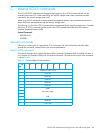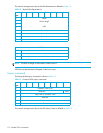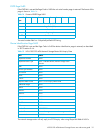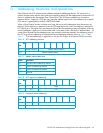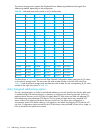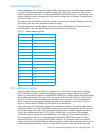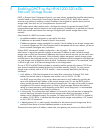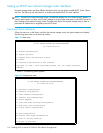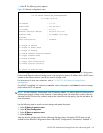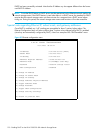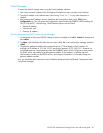
N1200-320 4Gb Network Storage Router user and service guide 115
Indexed addressing option
Indexed Addressing allows for host bus adapter (HBA) drivers that only use Peripheral Device addressing
to access SCSI devices attached to the network storage router. This is done by use of a table, which is
indexed by sequential LUN values, indicating selected BUS:TARGET:LUN devices. It is not possible in this
mode to address the network storage router as an network storage router unit directly. The table has the
structure as shown in Table 21.
The maximum size of the table is equal to the number of buses times the number of targets per bus, less
one initiator ID per bus, times the number of LUNs per target.
The index table can be manually edited. A method is also provided to perform SCSI device discovery,
and fill the table in the order that SCSI devices are discovered on the SCSI buses.
Table 21 Indexed addressing table
SCC addressing option
When an network storage router device is configured to use SCSI network storage router Commands
(SCC) addressing, the unit is capable of responding as an network storage router device to the FCP
Initiator, or routing the FCP request to a specified BUS:TARGET:LUN. When a request using the Peripheral
Device addressing method is received (an FCP command with the LUN field with bits 7 and 6 of byte 0
are set to 0), the unit routes the request to the internal processor, which acts on the command directly.
When a request using the Logical Unit addressing method is received (bits 7 and 6 set to 10b), the
request is routed to the BUS:TARGET:LUN as specified in the defined field.
Host systems using SCC addressing will typically do initial device discovery using the Peripheral Device
addressing method. On issuing an INQUIRY command to the network storage router, the host will receive
the network storage router Inquiry data, indicating the device type as a network storage router device
(Inquiry data indicates device type is 0xC). The host will then know, on this basis, that subsequent
commands to network storage router attached devices will use the Logical Unit addressing method.
The host can perform discovery by either walking through the BUS:TARGET:LUN values as would a
standard SCSI driver, or by issuing a REPORT LUNS command. This command is sent to the network
storage router (using the Peripheral Device addressing method), and the network storage router returns a
table indicating attached devices. The host can then perform actions on these network storage router
FCP LUN Value SCSI BUS:TARGET:LUN
0 0:0:0
10:1:0
20:2:0
30:3:0
40:4:0
50:5:0
60:6:0
(0:7:0 occupied by Initiator ID)
70:8:0
(...) (...)
13 0:14:0
14 0:15:0
15 1:0:0
16 1:1:0
17 1:2:0
(...) (...)





